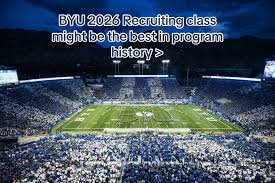As the 2025 college football season inches closer, a fierce quarterback battle is unfolding in Provo, Utah, where three talented players — McCae Hillstead, Treyson Bourguet, and freshman Bear Bachmeier — are all striving to become the starting quarterback for the BYU Cougars. With fall camp in full swing and the season opener against Portland State just weeks away, the coaching staff, led by offensive coordinator Aaron Roderick, is closely evaluating every move, every pass, and especially, every turnover.
This is more than just a competition for a starting job. At BYU, wearing the title of QB1 isn’t just about throwing touchdowns — it’s about shouldering a legacy. The position comes with a tremendous amount of responsibility and a unique kind of pressure, one that is deeply tied to the university’s history, values, and expectations from fans.
Riley Nelson, a former BYU quarterback, knows firsthand what it feels like to step into that role. He recently spoke on the “Y’s Guys” livestream, offering insights into what it truly means to be the starting quarterback at Brigham Young University. Nelson, who started his college career at Utah State before transferring to BYU, experienced his share of ups and downs. He lost two quarterback battles — one in Logan in 2006, and again in Provo in 2010 — before finally earning the starting role. When he did, he delivered with over 4,000 passing yards, 38 touchdown passes, and nearly 900 rushing yards during his time at BYU.
Nelson emphasized that the quarterback role at BYU is more than just athletic skill. The position demands character, composure, and a deep commitment to the values the university holds dear. One of the first things every quarterback at BYU must understand, according to Nelson and the current coaching staff, is that the football — the literal game ball — is sacred. Head coach Kalani Sitake often emphasizes this in both literal and symbolic terms. He reminds his players that the ball doesn’t belong to any one person — not the offense, not the coaching staff, and not even BYU itself. It belongs to the fans, the alumni, and the entire BYU community. It represents trust, tradition, and the legacy of the program. Therefore, protecting it is paramount.
Last season, ball security played a major role in deciding who would start under center. Jake Retzlaff beat out Gerry Bohanon largely due to his ability to avoid turnovers in their final scrimmage. That decision paid off, as Retzlaff led the Cougars to an impressive 11-2 record. This year, similar scrutiny is being placed on Hillstead, Bourguet, and Bachmeier. A single fumble or interception could be the difference between winning the job or being relegated to the sidelines.
Beyond ball security and physical performance, however, Nelson says there are five key traits every BYU quarterback must embrace if they want to succeed under the weight of the program’s expectations:
1. Embrace the Legacy.
The quarterback tradition at BYU is one of the richest in college football. From Jim McMahon to Steve Young to Ty Detmer, legends have come through the program. Each brought not just skill, but leadership and charisma. Any new QB must step into that lineage with humility and pride — and a readiness to add their name to that storied list.
2. Be Yourself.
Nelson shared how he initially tried to mold himself into what he thought others expected of a BYU quarterback. He learned over time that authenticity matters more. In his final two years, he was more comfortable simply being himself — and it showed in his performance and connection with teammates and fans. The pressure to be a “perfect” QB at a university with high moral standards can be intense, but being genuine wins trust.
3. Represent the University’s Values.
BYU is not just a football powerhouse — it’s a university grounded in spiritual and moral principles. Nelson recalled a moment during his playing days when he missed a throw in the red zone and let out a curse word, which was caught on camera. Social media quickly reminded him that BYU fans expect their QB to uphold the university’s standards at all times, both on and off the field. Living by those values, being active in the community, and embracing the opportunity to lead by example are vital to holding the QB1 mantle.
4. Be Diligent in Preparation.
According to Nelson, BYU fans and coaches can immediately tell when a quarterback has prepared diligently. Whether it’s film study, understanding the playbook, or developing chemistry with receivers, effort and commitment are non-negotiable. It’s not just about showing up on game day — it’s about everything that happens before the lights come on.
5. Serve Others.
At BYU, leadership is service-oriented. The quarterback isn’t just the face of the offense — he is a role model, a mentor to younger players, and a public representative of the school’s mission. Nelson noted that when players use their platform to make a positive impact in the community, fans rally behind them even more.
The battle between Hillstead, Bourguet, and Bachmeier is intense, but it’s also a valuable learning opportunity for each athlete. They’re not just fighting for a job — they’re preparing to carry one of the most revered roles in BYU athletics. The competition itself is shaping them into better players and, perhaps more importantly, better people.
Whoever emerges as the starter will not only need to deliver wins but also live up to the legacy of the greats who came before — and uphold the standards of the university they represent. It’s a pressure-cooker of a position, but for the right player, it’s also the opportunity of a lifetime.
So, as the clock ticks toward the season opener, all eyes are on this quarterback trio. Coaches are watching every drill, every throw, and every decision. Fans are buzzing with anticipation. And the history of BYU football quietly waits to see who will be its next chapter — someone capable of handling the sacred ball, honoring the program’s values, and rising to the challenge of leading the Cougars onto the field this fall.



